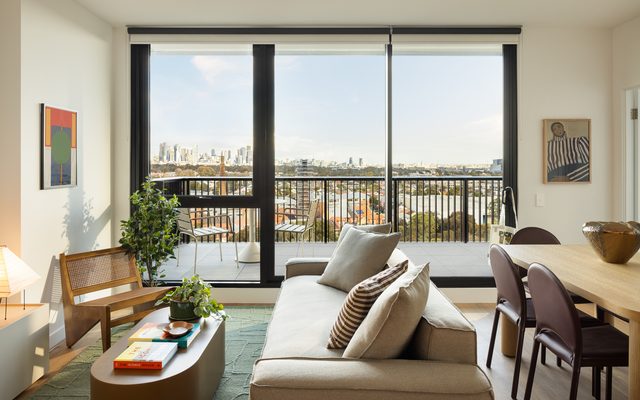This article is from the Australian Property Journal archive
AS part of Victoria’s Housing Statement – The Decade Ahead 2024-2034, the state government has added further protections to renters‘ rights, while defending its position against rent control.
The section on renters’ protection in Wednesday’s Housing Statement emphasises additional supply to make the private rental market more affordable, reporting an increase in typical rents of 21% in Metropolitan Melbourne and 40% in regional Victoria.
The government is estimating an additional 230,000 rental properties to be added to the Victorian market over the next decade, including 70,000 facilitated by the measures outlined in the Housing Statement.
New protections will see rent increases restricted between successive fixed-term rental agreements to discourage landlords from evicting tenants just to raise the rent substantially when re-listing.
If agents or landlords issue a new lease after they’ve evicted previous tenants on their first fixed-term lease, they will be required to offer the property at the same rent for at least 12 months.
Additionally, all types of rental bidding are set to be banned across the state.
2021 saw the Victorian government make it illegal for real estate agents or landlords to solicit or encourage higher offers than the advertised price of a rental property.
The new reforms will make unsolicited bids, either to pay more weekly rent or to pay more than four weeks in advance, illegal by making it an offence to accept bids and by introducing harsher penalties for agents and landlords in violation.
The government will also establish Rental Dispute Resolution Victoria, for renters, agents and landlords to resolve tenancy disputes over rent, damages, repairs and bonds.
This has been designed to make VCAT the last resort, reserved for serious or complicated issues.
A portable rental bond scheme is also being established, meaning tenants can carry their bond from one property straight over to another, rather than paying a new bond each time or waiting to get their old bond back to pay the new one.
Notices of rent increases and notices to vacate are also being extended to 90 days.
Mandatory training and licensing will be required for all real estate agents, property managers, owners corporation managers and conveyancers.
Rental applications are also set to be standardised and the kind of information agents or landlords are allowed to keep on file and for how long will be limited.
Finally, the government has announced a $2 million Rental Stress Support Package through the Victorian Property Fund.
The package will help address the high demand for rental assistance placed on organisations that work to prevent homelessness by providing legal assistance, financial information and advocacy services.
Back in July, the Andrews government looked to be considering introducing rental caps but in Wednesday’s statement a lengthy statement was given to defend a position against such measures.
The statement refers to World War II and cites rent controls introduced in several US cities and Stockholm, Sweden as case studies against caps.
“Rent control often worsens the housing crisis by discouraging investment in housing, reducing the quality of rentals and distorting the housing market,” read the statement.
The Affordability Partnership signed by the government and announced with the statement was made alongside the Property Council of Australia, Master Builders Victoria, the Urban Development Institute of Australia, the Housing Industry Association and Super Housing Partnerships.
In a statement by Quentin Kilian, the Real Estate Institute of Victoria (REIV) CEO has criticised the government’s latest rental reforms as placing unneeded restrictions on landlords.
“Today’s statement fails to articulate a plan for attracting and retaining existing residential real estate investors – the overwhelming majority of whom are average Victorians – to bring it to fruition,” said Kilian.
Kilian particularly addressed issues with restrictions to rent increases on successive fixed-term leases, restrictions on rent bidding by tenants and extending notice for rent increase 90 days. The CEO cited the importance of landlords being able to adjust their pricing based on market conditions.
Meanwhile, the federal government’s reform to rental assistance seems to fall short of sky high rents across the country.
The maximum rate of Commonwealth Rent Assistance for singles has been increased by $27.60 to $184.80 a fortnight.
While the payment for a household with one or two children will increase by $32.34 to $217.28.
“This increase to Commonwealth Rent Assistance is welcome but it will be swallowed by the high cost of rents and further hikes,” said Maiy Azize, spokesperson from Everybody’s Home.
“Today’s increase to the payment won’t be enough to lift many renters out of housing stress and many vulnerable people will miss out on the rise entirely.”
Azize noted that rents across many areas in the country have already risen by hundreds of dollars over the last three year with little sign of slowing down.
“As rents have soared since the pandemic, rent assistance has not been keeping pace. On top of this, the payment excludes many of those on the lowest incomes, with two in three people on JobSeeker ineligible,” added Azize.
“Rent assistance needs a major shake up – it must be indexed to better reflect rentpaid, and help people who need it the most. Reforming the payment will provide immediate relief to renters but the key solution to fixing the rental crisis is building enough social housing to end the huge shortfall.”




